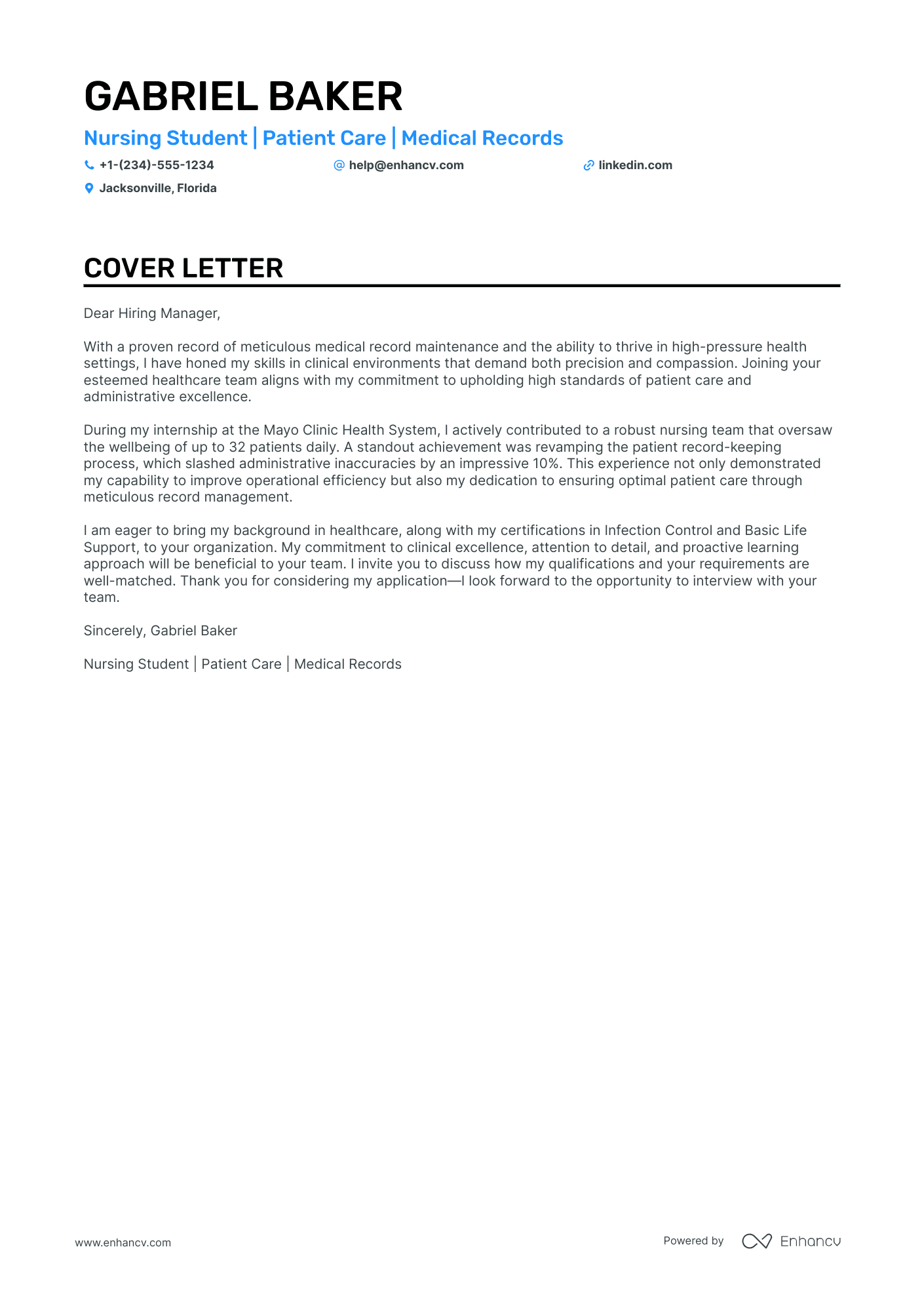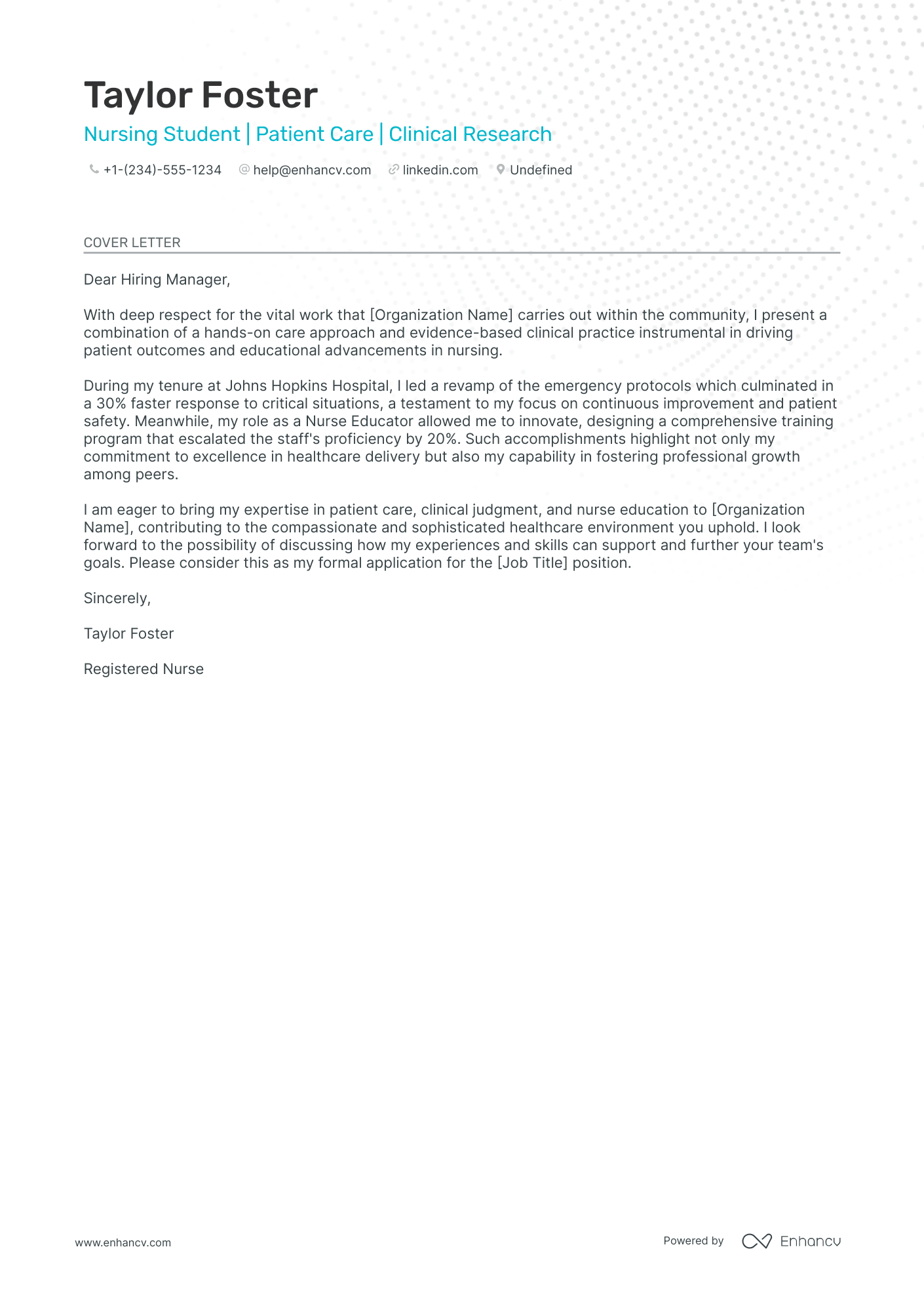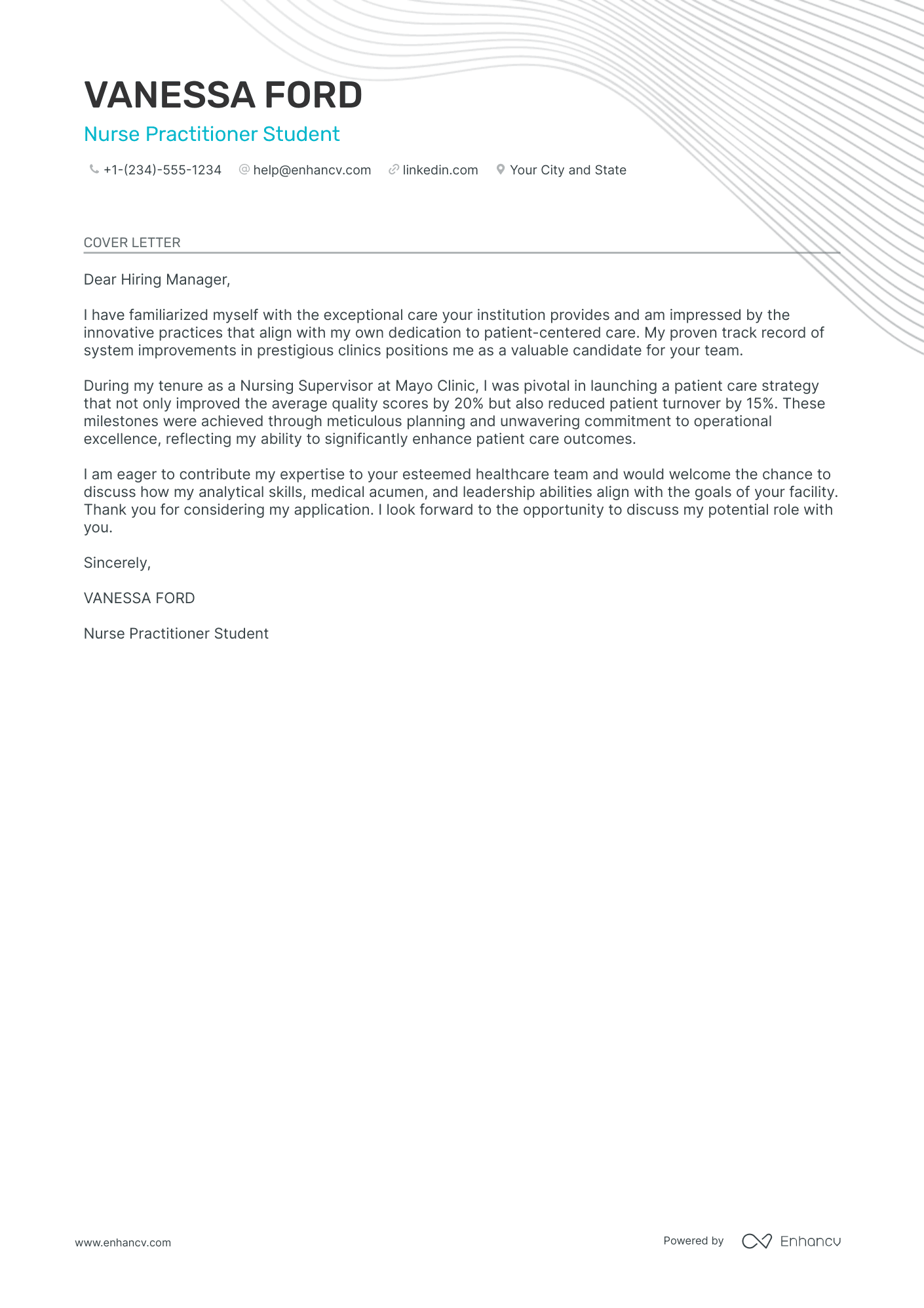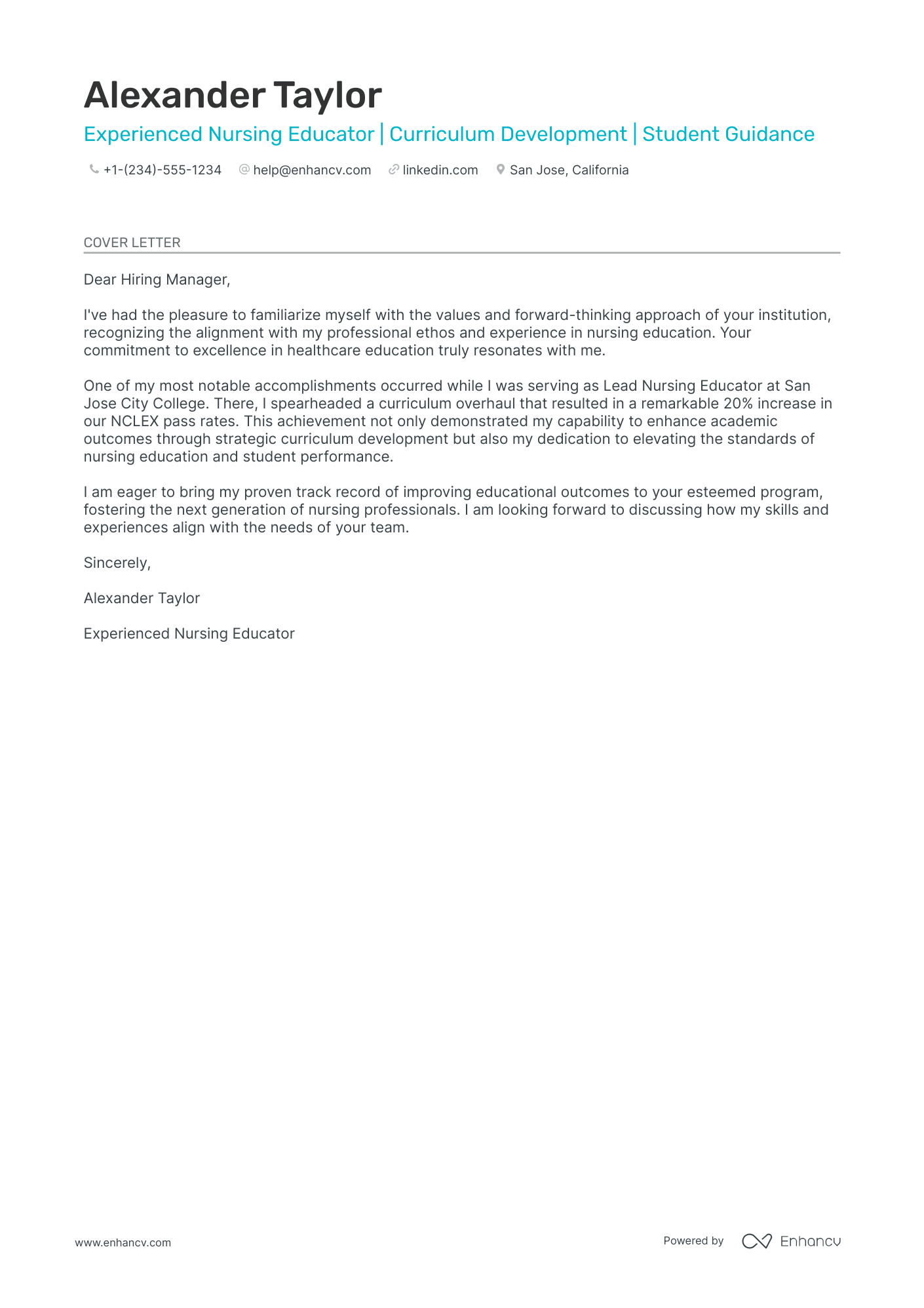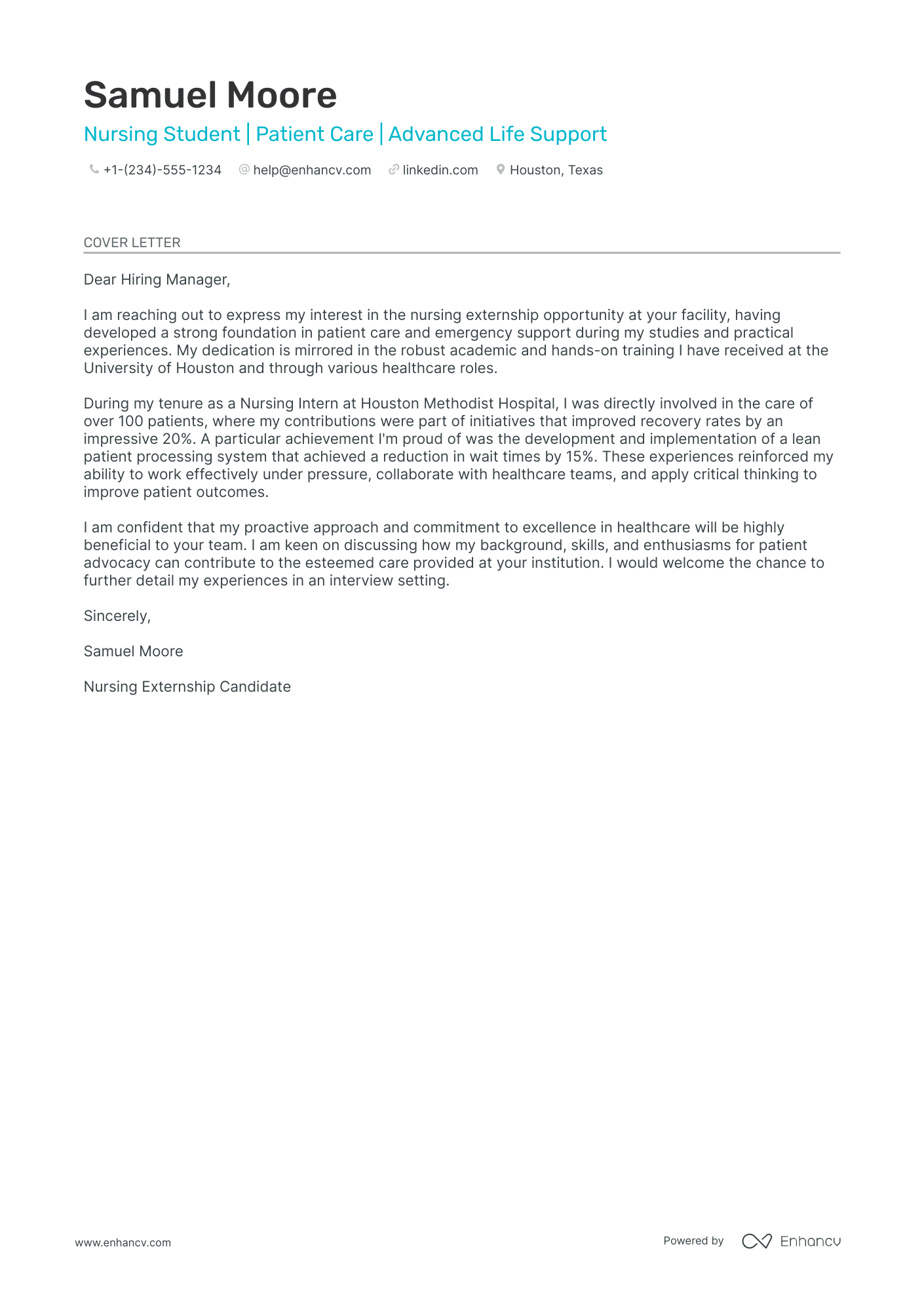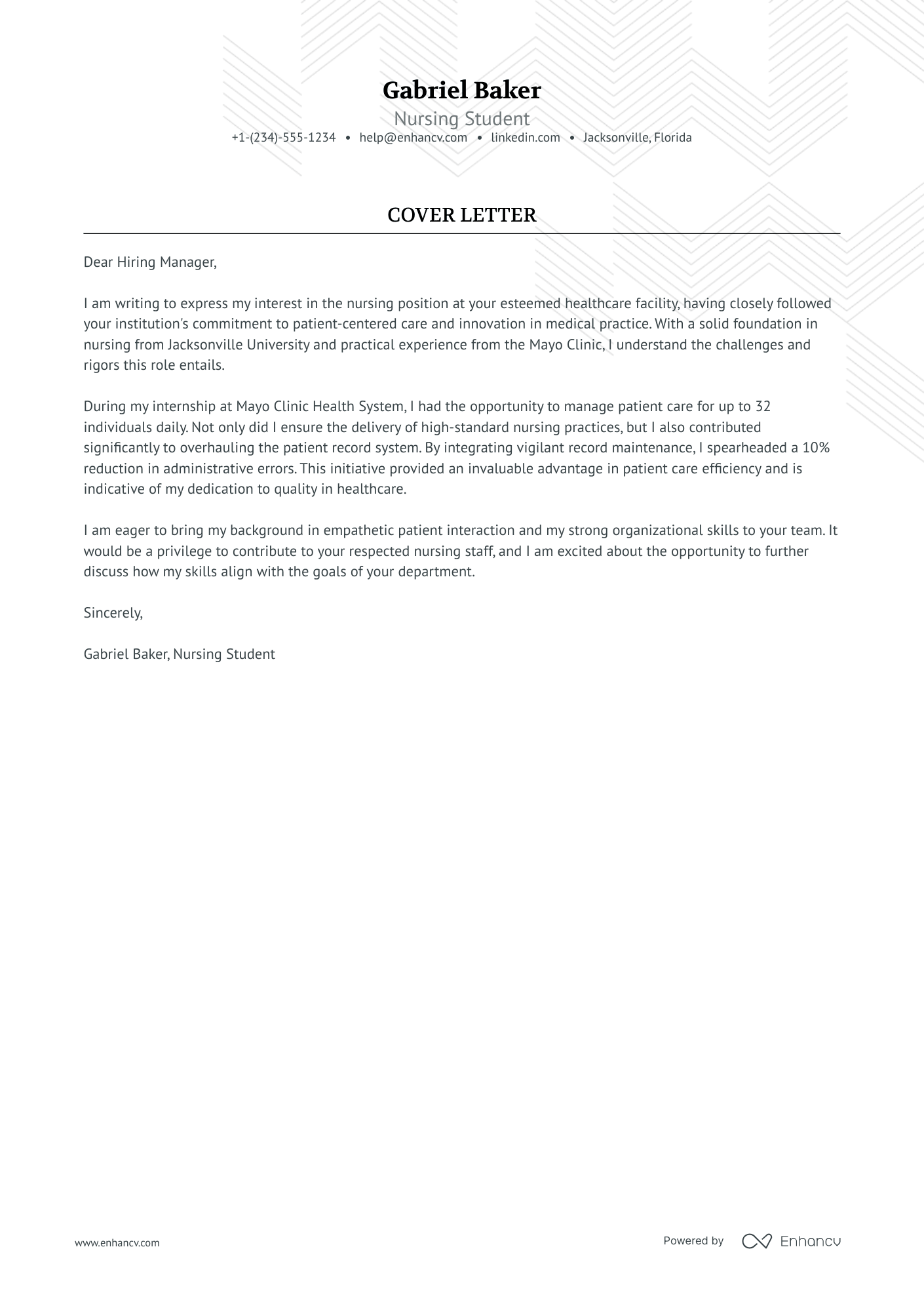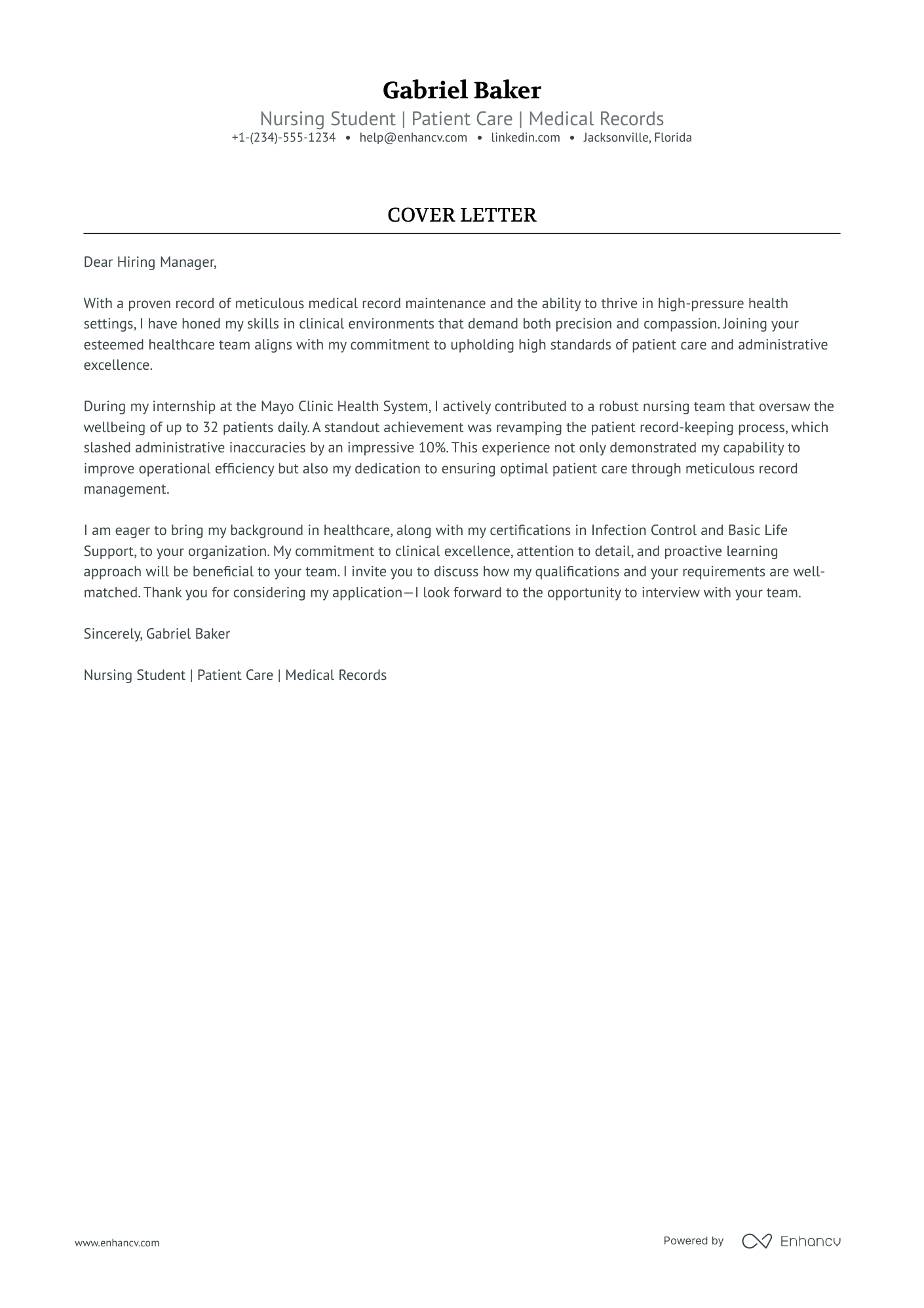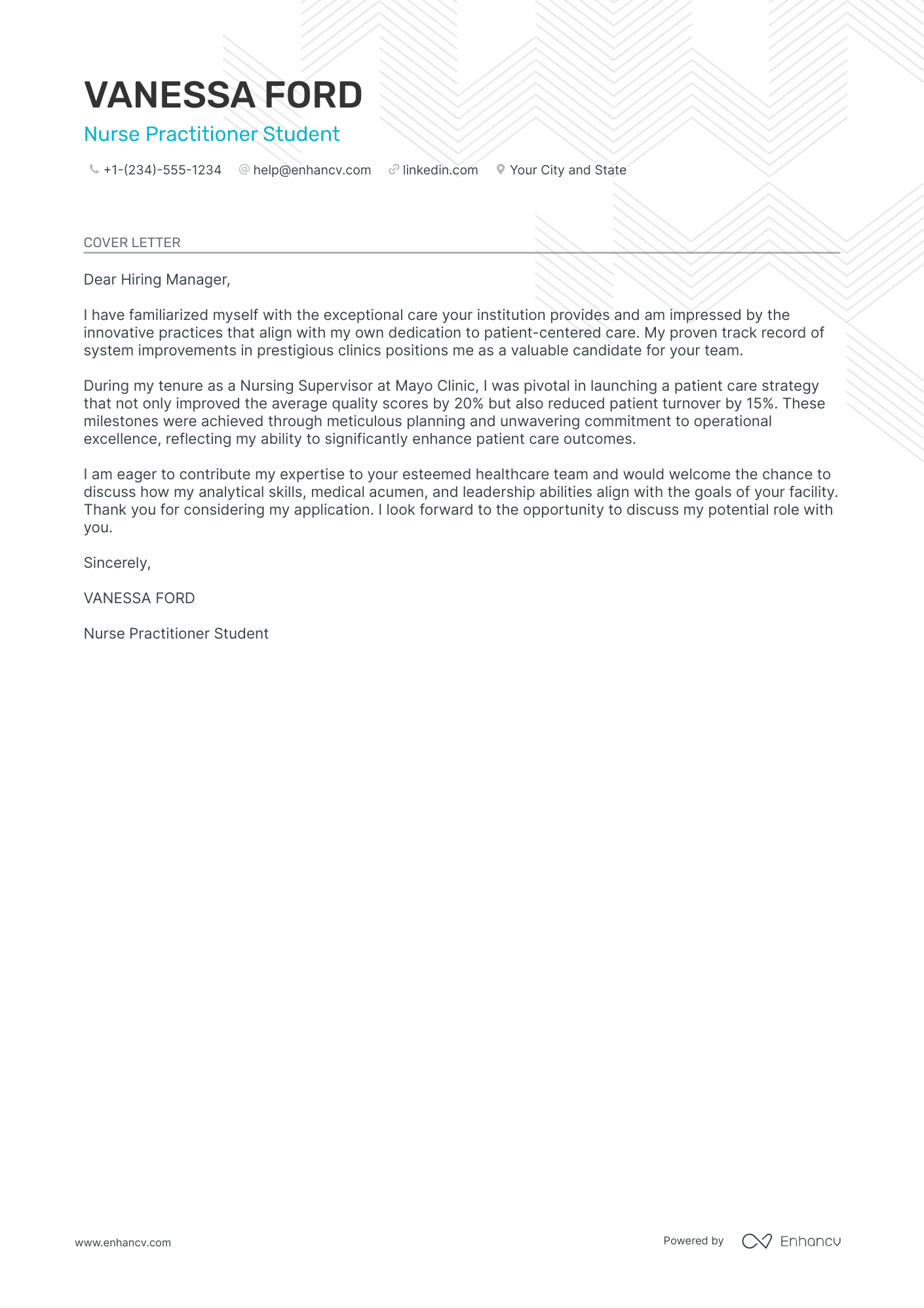Embarking on your nursing career, you've hit a common snag: the daunting task of writing a cover letter that stands out. Unlike your resume, your nursing student cover letter is your chance to showcase a crowning achievement, weaving a compelling narrative that captures your professional pride. Strike a balance between formality and originality, dodging clichés that dull your unique story. Remember, brevity is key—your impactful message should unfold in just one page. Let's guide you through crafting a cover letter that shines.
- Write a nursing student cover letter that helps you stand out (and get the job);
- Understand how to start and end your nursing student cover letter with the appropriate greeting;
- What to include in the body of your nursing student cover letter to put your best foot forward;
- Your most important achievements - how to present them as part of your nursing student cover letter.
And if you want to make your life even easier, simply drag and drop your nursing student resume into Enhancv's AI cover letter generator, and it will write your cover letter for you in just a few moments.
If the nursing student isn't exactly the one you're looking for we have a plethora of cover letter examples for jobs like this one:
Drop your resume here or choose a file.
PDF & DOCX only. Max 2MB file size.
Nursing student cover letter example
Michelle Sanders
Cleveland, OH
+1-(234)-555-1234
help@enhancv.com
- Highlighting relevant educational background (e.g., "honed my skills at Case Western Reserve University") emphasizes the candidate's formal training and foundation in nursing, which is crucial for a job in the medical field.
- Describing specific volunteer experience (e.g., "volunteer time with the American Red Cross") demonstrates the applicant's practical experience and commitment to healthcare outside of formal education.
- Illustrating the impact of one’s work (e.g., "instrumental in orchestrating a community health survey analysis") showcases the ability to perform data-driven decision-making and create community health initiatives, important in evidence-based medical practice and public health.
- Mentioning soft skills, such as being detail-oriented and having empathetic communication abilities, addresses the interpersonal skills required in nursing to effectively interact with patients and colleagues.
Designing your nursing student cover letter: what is the best format
Let's start with the basics, your nursing student cover letter should include your:
- Header
- Greeting
- Introduction
- Body paragraph
- Closing statement
- Signature (that's not a must)
Next, we'll move to the spacing of your nursing student cover letter, and yes, it should be single-spaced (automatically formatted for you in our cover letter templates).
Don't go for a old-school font (e.g. Arial or Times New Roman), but instead, pick an ATS-favorite like Chivo, Volkhov, or Raleway, to stand out.
Our cover letter builder is also set up for you with the standard one-inch margin, all around the text.
Finally, ensure your nursing student resume and cover letter are in the same font and are submitted in PDF (to keep the formatting in place).
P.S. The Applicant Tracker System (or ATS) won't be assessing your [job] cover letter, it's solely for the recruiters' eyes.
Don’t let a busy schedule hold you back. Try our free cover letter generator and build a great letter in seconds.
The top sections on a nursing student cover letter
- Header: This section includes your contact information, the date, and the employer's contact details, providing a professional appearance and making it easy for the recruiter to reach you.
- Salutation: A personalized greeting addressing the hiring manager by name demonstrates that you've done your research and adds a personal touch to your cover letter.
- Introduction: Here, you should state your nursing program, your passion for the nursing field, and why you're interested in the specific healthcare facility, setting the tone for the rest of your cover letter.
- Body: This is where you elaborate on your clinical experiences, relevant coursework, and any special skills or volunteer work that makes you a unique fit for the nursing position.
- Closing: In the closing section, reiterate your enthusiasm for the opportunity, invite the recruiter to review your attached resume, and include a call to action, such as requesting an interview or stating your intention to follow up.
Key qualities recruiters search for in a candidate’s cover letter
- Clinical competence and technical skills: Ability to perform essential nursing tasks efficiently and accurately, adhering to medical protocols and hospital policies.
- Empathy and strong patient advocacy: Demonstrates understanding and sensitivity to patient needs and concerns, and effectively communicates to ensure patient comfort and safety.
- Adaptability and resilience: Ability to handle high-stress situations, adapt to rapidly changing environments, and maintain composure during emergencies or unexpected events.
- Attention to detail: Consistently observes and accurately documents patient health status, medication administration, and response to treatments.
- Teamwork and collaboration: Works effectively with interdisciplinary healthcare teams, contributing to patient care planning, and supporting peers and superiors.
- Commitment to professional development: Shows initiative to continuously learn, engage in professional education, and apply evidence-based practices to improve patient outcomes.
How to personalize your nursing student cover letter greeting
Before you start writing your nursing student cover letter, take the time to find out who is recruiting for the role.
Search for the recruiter's name on LinkedIn or the corporate website to address them personally in your nursing student cover letter salutation.
What if you can't find out who's recruiting for the role?
Always aim to avoid the very impersonal "Dear Sir/Madam" - instead, opt out for "Dear HR Team" or "Dear Hiring Manager" to make a better first impression.
List of salutations you can use
- Dear Hiring Manager
- Dear [Department] Team
- Dear [Specific Position Title] Hiring Committee
- Dear Dr. [Last Name]
- Dear Ms. [Last Name]
- Dear Mr. [Last Name]
Introducing your profile to catch recruiters' attention in no more than two sentences
The introduction of your nursing student cover letter is a whole Catch 22 .
You have an allocated space of no more than just a paragraph (of up to two sentences). With your introduction, you have to stand out and show why you're the best candidate out there.
Set out on a journey with your nursing student cover letter by focusing on why you're passionate about the job. Match your personal skills and interests to the role.
Another option for your nursing student cover letter introduction is to show you're the ideal candidate. Write about how your achievements and skills are precisely what the company is looking for.
However you decide to start your nursing student cover letter, always remember to write about the value you'd bring about. Making it both tangible (with your metrics of success) and highly sought out.
How to select your best achievement for the middle, or the nursing student cover letter body
You probably feel exhausted by this point in your application: you've dived into all the details of your success and skills in your nursing student resume.
What else can you include in your nursing student cover letter body?
Well, for starters, the next three to six paragraphs should show you further value as a professional. Or, why should recruiters choose you?
Think back on a noteworthy achievement that answers key job requirements and dive deep.
Structure your nursing student cover letter middle as you'd a story: following chronological logic and highlighting outcomes, thanks to skills.
At the end of the day, you'd want recruiters to be able to see you as the best candidate for the role and understand more about who you are and what makes your success unique (and valuable to the role).
Time to wrap up your nursing student cover letter
Writing the closing paragraph of your nursing student cover letter is just as important as the salutation.
You have to make it personalized to the job advert and recruiter.
Experienced professionals advise candidates to end with a request or reminder for follow-up. Write that you're grateful for the opportunity, and, at the same time, hint that you're available for the next steps of the process.
Otherwise, you could also conclude your nursing student cover letter by facing the future. How do you see yourself, as part of the team? In particular, how would you settle in your new role in the first six months to a year?
Which story should you tell in your nursing student cover letter when you have zero experience
Candidates, lacking professional experience in the field - this one is for you.
Your nursing student cover letter is an exercise of integrity, honesty, and, above all, spinning a positive narrative around your strengths.
And what better way to capture recruiters' attention than with your most job-relevant achievement (this could be from your internship or volunteering experience)?
Make sure to back up your success with transferrable skills that are relevant to the job (e.g. how your year, studying abroad, has taught you to be more motivated and handle multicultural environments).
Another safe card you can bet on is your career dream: in the body of your nursing student cover letter, go into the details of how your ambitions would help make the company you're applying for better.
Key takeaways
Creating your nursing student cover letter should be a personalized experience for the role and the recruiter, where you:
- Format your cover letter using the same ATS-friendly font (e.g. Railway) as you did for your resume;
- Greet recruiters, using their name, and follow up with two sentences to introduce yourself, your interest in the role, and to stand out;
- Map out one key success from your career (or life) that has taught you job-crucial skills;
- Substitute your lack of experience with an achievement from your internships, degrees, or volunteering gigs;
- End with a promise for your potential or your availability for an interview.
Nursing Student cover letter examples
By Experience
